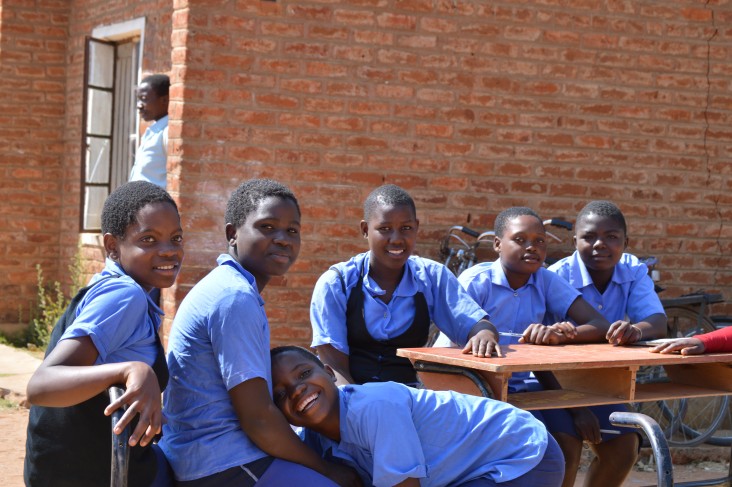Speeches Shim

When we educate girls and invest in their potential, there is no limit to the impact they can have. Girls who attend school have healthier families. They make more money. And they have fewer children, combatting perhaps the greatest challenge to Malawi's long-term development, population growth.” – Virginia Palmer, U.S. Ambassador to Malawi
Recent national and regional literacy tests have shown that Malawian students rank among the lowest in the sub-Saharan African region. In fact, in Malawi, 83% of Standard 1 students cannot read a single syllable and 92% cannot read a single word. Additionally, Standard 3 students on average can only read 11 words per minute and 67% cannot identify the first sound, or phoneme, in a word. This poses a major development challenge.
To counteract this problem, USAID, in collaboration with the Ministry of Education, Science and Technology (MoEST), supports Malawi’s education sector and focuses on developing fundamental literary skills among students. In addition, USAID works to improve learning outcomes, enhance access to education (especially for girls), improve the quality of education, and strengthen the overall capacity of MoEST systems and institutions.
Programs
- Malawi Early Grade Reading Improvement Activity (MERIT) (US$65 million / September 2015 – September 2020): Implemented by RTI International in all primary schools in Malawi to improve reading performance of Malawian students in standards 1-4. MERIT interventions will improve reading instruction and acquisition in the classroom, increase parental and community engagement in supporting student reading, create safer learning environments for reading, institute pathways for sustainability, and advance USAID/Malawi’s priority of integration across programs.
- National Reading Strategy Implementation Phase II (US$250,000 / August 2015 – November 2016): This activity, implemented by School to School International, provides expert technical assistance to the MoEST to develop a comprehensive implementation plan for the National Reading Program. This program incorporates the four main components of the National Reading Strategy: instruction, assessment, teacher preparation, and family and community participation.
- Strengthening Early Grade Reading in Malawi (SEGREM) (US$5 million / October 2014 – October 2017): Implemented by the Malawi Institute of Education, a parastatal organization, SEGREM reviews, revises, and creates reading materials and textbooks for the National Reading Program. It is also implementing an activity to improve primary teachers’ mastery of the English language.
- Early Grade Reading Activity (EGRA) (US$24 million / June 2013-October 2016): Implemented by RTI International in 11 education districts, EGRA provides technical assistance to the MoEST to improve the reading performance of Malawian students in Standards 1–3. EGRA improves early grade reading instruction, provides teaching and learning materials, encourages greater parental and community engagement in providing reading support, and strengthens the policy environment for early grade reading.
- EGRA Impact Evaluation (EGRAIE) (US$1.1 million / April 2013 – September 2018): This external evaluation, implemented by Social Impact, measures the effect of EGRA on student reading outcomes and tests the hypothesis that integrating USAID interventions in education, agriculture, and health, as well as adding a community strengthening component, results in increased learning amongst primary school students. Data collection for EGRAIE takes place in 2013, 2015 and 2017. In addition, a National Reading Assessment will be performed both in 2014 and 2016.
- USAID - Lakeland College Educational Partnership (US$US880,000 / March 2014-January 2017): In this partnership, twenty language arts teacher trainers from public Teacher Training Colleges in Malawi earn their Master of Education (M.Ed.) degree, with an emphasis in early grade reading instruction, at Lakeland College in Wisconsin, USA. The degree program includes a research practicum on early grade reading in Malawi.
- Girls’ Empowerment through Education and Health Activity (ASPIRE) (US$18.2 million / December 2014 – December 2018): ASPIRE is designed to specifically address the challenges that girls face in the Malawian Education system. It is a collaborative, co-funded activity between USAID/Malawi’s Education and Health Offices and implemented by Save the Children Federation Inc. that focuses on all primary and secondary schools in the Balaka, Machinga, and Zomba districts. The main goals are to improve the reading skills of girls in upper primary school, increase the adoption of positive sexual and health-care seeking behaviors, and decrease key structural and cultural barriers to girls’ access to schooling.
- Textbook Procurement (US$5 million / April 2015 – September 2020): In 2015, USAID in partnership with the MoEST procured Standard 1-8 textbooks for every student in Malawi and will continue to procure and replenish Standard 1-4 textbooks in support of the National Reading Program.
- Yesani Ophunzira Activity (YESA) (US$15 million / In Procurement): YESA will help the Malawian education system build its capacity to measure students’ reading acquisition and to create citizen demand for improved reading instruction.

Comment
Make a general inquiry or suggest an improvement.